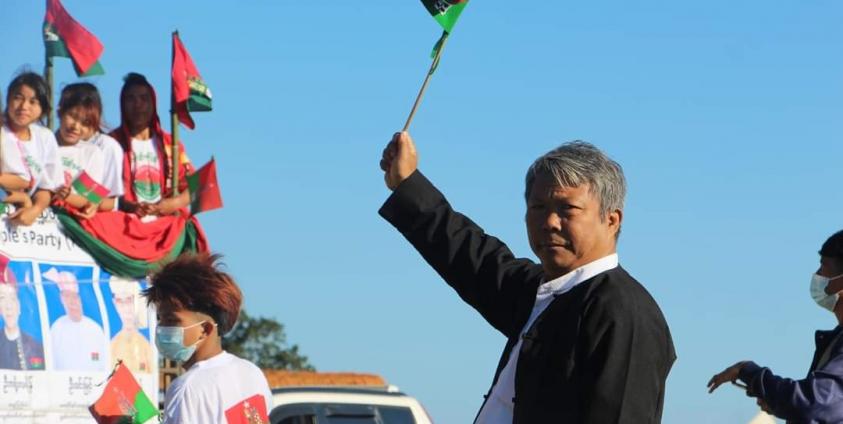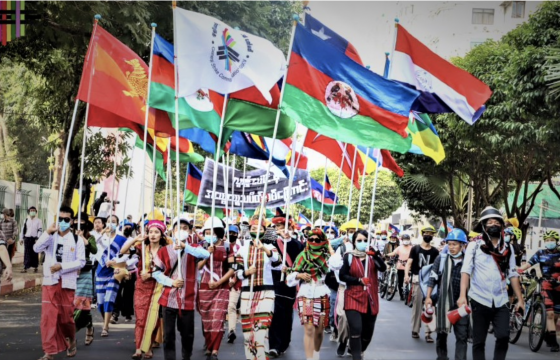The ruling National League for Democracy (NLD) secured the majority of constituencies in Kachin State in spite of widespread expectations that the Kachin State People’s Party (KSPP) would secure the constituencies in Swanparabwan, Machanbaw, Putao, Khaunglanphu, Myitkyina, Moemauk and Mansi Townships. In fact the KSPP only secured a few seats in these constituencies.
There were many local parties in 2015. In 2019, the Unity and Democracy Party (Kachin State), Kachin State Democracy Party, the Kachin Democratic Party and the Union Nationalities Federal Democracy Party (UNFDP) merged to form the Kachin State People’s Party (KSPP) as it was assumed that the big parties had influence over many local parties. The merger was made at the desires of locals. Many people had assumed that the KSPP as a united Kachin party could compete with the NLD in Kachin State.
However such pre-election optimism of ethnic Kachin people gaining a major say in both local and national parliaments has been dashed by a combination of factors including covd-19 restrictions, and allegedly systematic Bamar bias of the UEC- the National Elections Commission, which cancelled voting in no less than 11 townships where KSPP would have been favourites to win rather than the NLD.
But the NLD secured up to 51 seats in Kachin State, the USDP, 10, the KSPP, four, the New Democracy Party (Kachin), two, the SNLD, one, the Lisu National Development Party (Dulay Party), one and one independent candidate
The KSPP competed in 67 of 70 constituencies in Kachin State—35 for Kachin State parliament, 18 for lower house, 12 for upper house, one for Bamar ethnic affairs minister and one for Shan ethnic affairs minister. The KSPP projected that it would win the victory in Swanparabwan Township, where the majority of Kachin ethnic people are living. As it turned out the USDP secured both seats for the upper house and the Kachin State parliaments and the KSPP secured Kachin State constituency-2 only.
U Gwan Aung Kham, the KSPP candidate for Swanparabwan Township of the KSPP commented “The party was expected to garner the majority of votes in Swanparabwan.” It appears they did garner the majority of local votes from Kachin residents. U San Naw, a local from Swanparabwan Township clarified “90 per cent of locals in Swanparabwan cast their votes for the KSPP. But in August more than 400 military personnel arrived in Swanparabwan Township. The USDP secured the seat with the votes from the army. It is obvious whether the election is fair or not.”
As the winning margin for the USDP candidate was only 94 votes (UEC official figures), it is little surprise that many Kachin voters felt cheated that recently arrived and recently registered voters from outside the state were allowed to swing the result against the local Kachin.
"Absolutely, it wasn't a free and fair election," Gumgrawng Awng Hkam, vice chairman of the Kachin State People's Party , told Nikkei Asia journal.
The KSPP Vice Chair competed in the race for the lower House seat in Sumprabum Township but was defeated by the USDP. Gumgrawng Awng Hkam said local people voted for the KSPP, but a large number of advance votes by military personnel boosted the USDP’s candidate result and cost him the seat.
U in Gyaing Naw Gyar, the (KNC)) Kachin National Congress’s candidate who competed in Swanparabwan Township Constituency-2 said: “The reason why the KNC secured no seat as the UEC allowed migrant workers who live for more than 90 days, to cast their votes. There are many people who applied for voting with Form-3. The number of such persons is higher than that of locals. The KNC’s frequent attempts to amend the provision of rule failed. Now ethnic parties have to suffer the consequence of Section 3 (a) of the rule.”
In a number constituencies the KSPP many voters may have abandoned KSPP in the last weeks of the campaign after local Kachin media quoted the chief minister as saying during the campaign that the KSPP is allied with the USDP.“It made the public change their mind. It severely impacted our result,” Awng Hkam said. This would have driven many voters into the NLD camp, not wishing to risk their votes ending up with any party aligned with a pro-military proxy party.
Ethnic-based Kachin parties were also massively handicapped by their lack of information channels and the covid-19 restrictions which stopped public rallies by which they could make themselves better known to the public. The KSPP had no chance to conduct election campaigns in Mohnyin and Hapkant Townships where the COVID-19 cases were reported. It could narrow the local parties’ chance of winning the seats. It is a special blow to a newly-formed party like KSPP created in 2019.
Manam Tu Ja, chairman of the Kachin State People's Party, or KSPP, said in an interview with Kachin-based media outlet Kachin Waves. "So far, the result is not as good as we expected," he added. I think also because of COVID-19 restrictions the public in Kachin didn't get a chance to be introduced to the party's policies."
The KSPP competed in 67 of 70 constituencies in Kachin State—35 for Kachin State parliament, 18 for lower house, 12 for upper house, one for Bamar ethnic affairs minister and one for Shan ethnic affairs minister.
Awng Hkam agreed the election result fell far short of the KSPP’s prediction before the election that it would win a majority in the state parliament and win most of Kachin State’s seats in the Union Parliament
The Kachin National Congress (KNC) did not win any seat in the election though the party was expected to win up to 30 per cent seats.
The KNC competed in 20 seats—four in Putao, Mohnyin, Bhamaw and Myitkyina District in Kachin State and two for the lower house, State parliament and one for ethnic affairs minister, in Namatu Township in Shan State. The KNC secured no seat in the 2020 election but won more supporters.
In addition, other ethnic parties in Kachin State like the Tai-Leng Nationalities Development Party (TNDP) and the SNLD did not win seats even in the areas where they were strong.
U Sai Htay Aung, an in-charge of the Kachin party (TNDP) said: “The main reason why the ethnic parties lost the election is the public’s trust in Daw Aung San Suu Kyi is so strong. The public believes in her. The people think that the ethnic parties are unable to form the government and to amend the 2008 Constitution. The ethnic parties still have many weaknesses.” The party did not secure any seat in the 2020 election.
The SNLD competed in 12 constituencies in Kachin State in the hope of creating the rights of indigenous people. The party did not win any seat, though it was expected to win at least seven seats.
U Sai Kyaw Thiha, the SNLD’s candidate who competed in Moemauk Constituency-4 said: “The voter turnout is higher than that in 2015. But we cannot overtake the ruling party because there are many advantages of the big parties. But the biggest problem for ethnic-based parties is the lack of impartiality of the UEC.”
U Sar Gyi from the KDNG said: “There are two reasons why the local parties faced losses in the election. Local ethnics are in the minority. (In some areas). Locals think that the ethnic parties cannot form the government and overthrow the dictator. Some people did not cast their votes. There are still several Kachin parties. Kachin parties still need more unity.”
Conclusion
Many people assumed that the KSPP as a united Kachin party could compete with the NLD in Kachin State achieve a historic breakthrough based on a strong groundswell of disillusionment. With the NLD record on ethnic rights, and their failure to advance the peace process. The KSPP's response is that if it had been a free and fair election, and a level playing field they would have taken many more seats from both big parties –NLD and USDP.
International groups such as Human Rights Watch have strongly backed claims by KSPP that it was not a free and fair election, with mass disenfranchisement of ethnic voter’s rights. Myanmar civil society has also queried many decisions of UEC and its apparent Bamar bias.
Another handicap is that the KSPP was also up against the formidable and well-funded NLD party machine which could harness all the advantages of also being the incumbent party.
In order to achieve a better result in the next election in 2025 they will need to push for changes in the UEC to make it less Bamar-dominated, and above all the freedom to campaign without all the crippling restrictions of covid-19.






